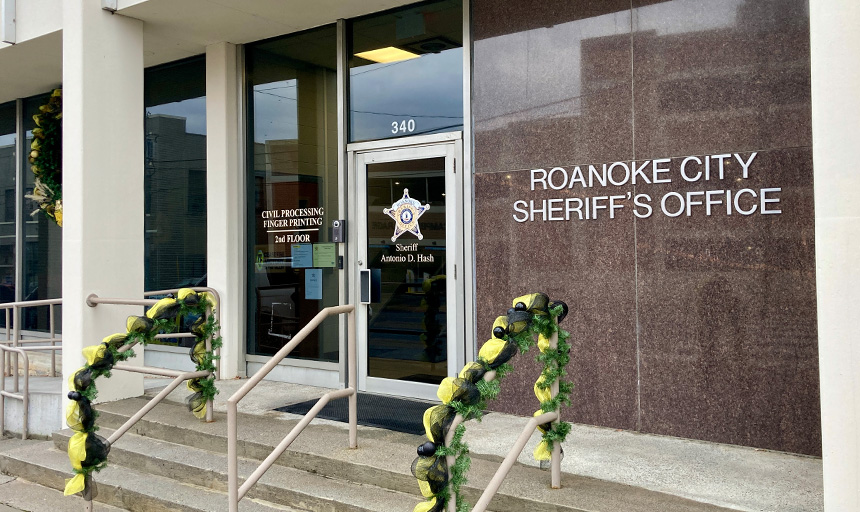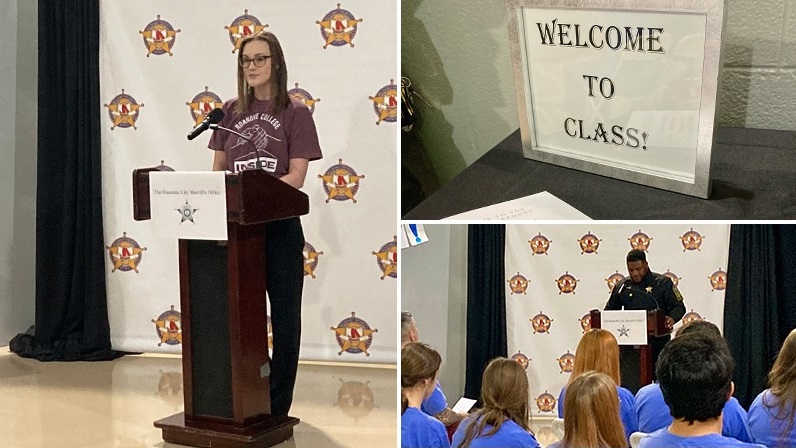
Roanoke College has expanded a unique community partnership that breaks down barriers and deepens our understanding of one another.
The Inside-Out Prison Exchange Program, an initiative originated at Temple University, was introduced in the Roanoke City Adult Detention Center (RCDC) for the first time this semester. This is the second location that college faculty has joined with to offer the innovative, on-site program that brings together people who are incarcerated (“insiders”) with traditional Roanoke students (“outsiders”) to learn alongside one another in a semester-long course.
“This program is groundbreaking,” said Roanoke City Sheriff Antonio Hash, who became impressed with the work after attending a class certificate ceremony in neighboring Roanoke County last fall.
“I saw its amazing impact,” he said, adding that the collaboration benefits both college students and inmates who are embracing a journey of healing and rehabilitation. Sheriff Hash was moved to start the process of bringing the program to Roanoke City, which is the largest locality in the region, as part of his office’s comprehensive, anti-recidivism initiative, (R.)I.G.N.I.T.E.
Inside-Out was first brought to Roanoke College in 2019 by Associate Professor of Criminal Justice Daisy Ball. It’s operated since then at the Roanoke County/Salem Jail and remains one of just a handful of such programs across the state.
The non-traditional circumstances of the courses (college-level classes conducted in jail facilities) and the chance to engage in deep discussions about issues of faith, justice and societal change (all topics of past Inside-Out classes) have helped students on both sides bust stereotypes and see the world through a new lens.
Insider students in RCDC said they went into the program nervous about taking on the course. But the weekly class sessions became a highlight for them as they were challenged to grow and approach issues from new perspectives.
“Programs like Inside-Out are a silver lining behind the clouds,” said one insider, adding that such opportunities are a crucial part of the path toward starting a new life and “honestly and truly finding change within ourselves.” (Inside-Out privacy guidelines prohibit Roanoke College from naming insider students.)

The Inside-Out partnership with RCDC hosted a certificate ceremony Dec. 1 to celebrate the work of its students and the completion of the semester. Speakers included Assistant Professor Sarah Murray (pictured above), Sheriff Antonio Hash and students.
This semester’s course, “Stigma & Society,” was led by Assistant Professor of Criminal Justice Sarah Murray. Gathered in a circle of folding chairs, students were urged to reexamine preconceptions, engage in thoughtful dialogue about what makes us different and what we share, and reflect on the origins and legacies of stigmas.
Skye Digou '25, a criminal justice major and sociology minor, said the blend of students was able to build bridges and connect with one another, taking away lessons that will stay with her long after this semester. The opportunity to be part of Inside-Out was one of the first things that stood out to her about Roanoke when she was looking at colleges back in high school, she added.
“I had never heard of a program that does something like this,” she said. “To be offering such an interesting and unique program, especially with Roanoke College being a smaller school, it really showed me how great a place this would be for all the different programs and opportunities I wanted to pursue.”
Roanoke City hopes to continue the partnership with Roanoke College in future semesters. In the spring, Inside-Out will rotate to the Roanoke County/Salem Jail for a sociology class led by Lecturer Kristin Richardson.
Ball, who created the local Inside-Out program, said it was exciting to see it growing to new localities.
“We’re grateful to Sheriff Hash for this opportunity to work with a new population,” she said. “Expanding our partnerships is also incredibly valuable for our students because it gives them experience with different types of facilities and communities. It allows them to see the world in a broader context and think about things outside of their normal experiences.”